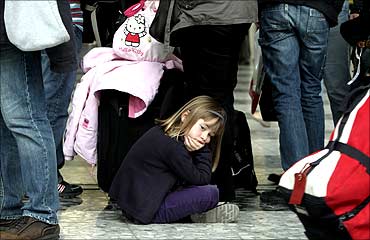
A volcano, named Eyjafjallajoekull, in Iceland has spread havoc across Europe hitting businesses across the world.
Airlines are losing over $200 million per day according to the International Air Transport Association. The Indian airline industry, which had started recovering from the recession has also lost crores in terms of passenger revenue.Millions of passengers have been stranded at various airports across Europe. Airlines and travel firms are the biggest losers. A total of 313 airports have been affected, with over 63,000 flight cancellations since April 15.
Flights to the UK and other European destinations of Air India, Jet Airways and Kingfisher Airlines remained cancelled for the sixth consecutive day today in the wake of huge clouds of volcanic ash emanating from Iceland.
To add to their woes, airlines will have to bear additional costs for re-routing their aircraft and taking care for stranded passengers and aircraft at various airports.
While the ailing airline industry has borne the brunt volcanic ash from Iceland, several other businesses also remain affected. . . .
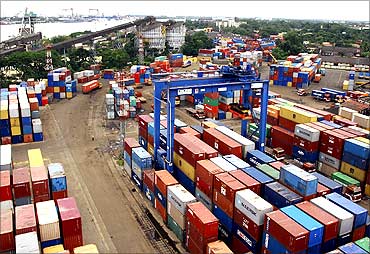
High-end merchandise exports from India worth $1 billion are likely to be affected due to the air travel crisis, says a Business Standard report.
Exporters, particularly, those dealing with new clients are more at risk of losing their business, rejection of shipment and cancellation of order bookings.
According to industry estimates, exporters are incurring a daily loss of around Rs 20 crore (Rs 200 million). In Maharashtra, exporters have stopped buying fresh vegetables and fruits from farmers because they expect air services to resume after April 23, the report said.
. . .

Exports from the Korean electronics industry have been hit. Europe accounts for about 10 per cent of the nation's electronics product exports.
Exporters of perishable goods, including food and flowers have been badly hit. Food exports from Africa, Kenya, South America and the Caribbean have been affected.
. . .

The Kenyan economy is losing $3.8 million a day as a result of flight cancellations to Europe. About $12 million worth of flowers and vegetables exports for European markets have already got cancelled.
The New Zealand economy is likely to lose $1.1 million a day due to the Iceland volcano disruption.
Meanwhile, the Turkish lira hit a 10-day low and Turkish stocks hit 2-1/2 week lows over concerns about the tourism industry.
. . .

Indian publishing companies were forced to cancel their plans of opening stalls at the fair. Flipkart.com cancelled its participation at the London Book Fair 2010.
The mass cancellation of flights from Europe due to the volcanic eruption in Iceland is likely to deal a blow to China's exhibition industry which every year helps Chinese businessmen to strike billions of dollars of deals to sell their goods their in European markets.
April typically marks the beginning of the exhibition season in the country. Auto China 2010 - an annual exhibition for global auto giants to promote new cars that was slated to start on Friday in Beijing - now faces some uncertainty.
. . .
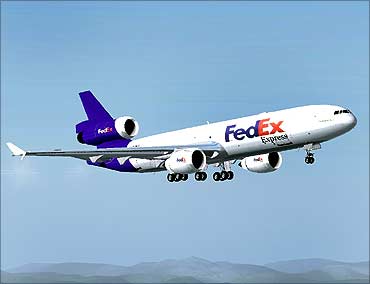
FedEx, DHL and TNT have reported disruption of services.
The Japanese MotoGP race, an international sporting event had to be postponed due to the flight cancellations.
. . .
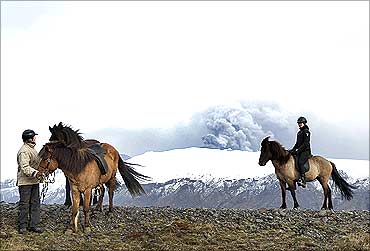
Planes that flew through the ash clouds have faced engine damage. This time, several NATO F-16 fighters suffered engine damage after flying through the volcanic ash cloud.
Meanwhile, the International Air Transport Association(IATA) has blamed the government for its slow response to the crisis that is robbing the industry of billions of dollars.
"We are far enough into this crisis to express our dissatisfaction on how governments have managed it-with no risk assessment, no consultation, coordination, and leadership. This crisis is costing airlines at least $200 million a day in lost revenues and the European economy is suffering billions of dollars in lost business. In the face of such dire economic consequences, it is incredible that Europe's transport ministers have taken five days to organize a teleconference," said Giovanni Bisignani, IATA's Director General and CEO.
. . .
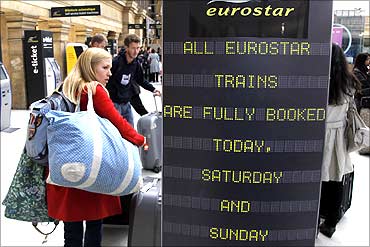
Eateries and shops in the airports see more business with stranded passengers.
. . .